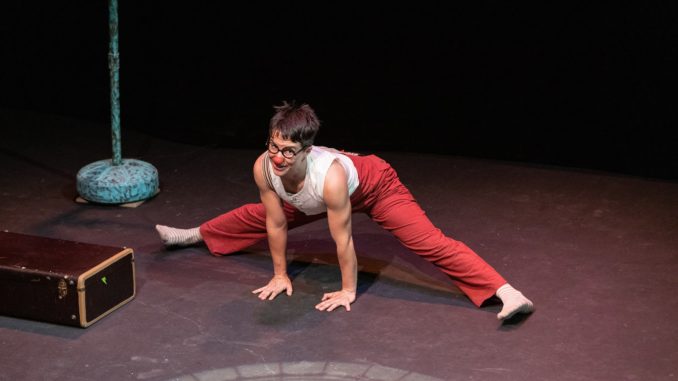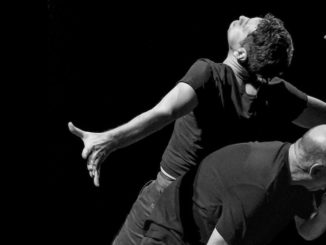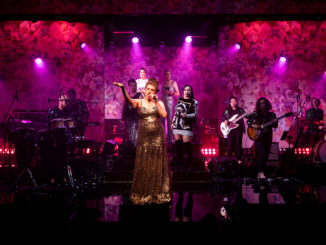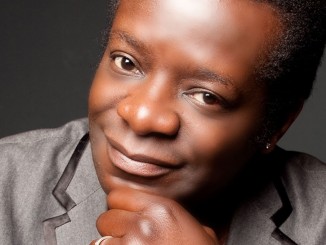
[Gender Training]
A solo performance piece by New York-based clown and theatre artist Ania Upstill, Transhumance is the funny and poignant story of one clown’s exploration of gender, as they try on different genders and live through each one’s pros and cons.
Clad in gender-neutral one-piece undergarments and a coat, Upstill’s clown is charming and captivating, immediately setting us at ease even as they establish there is no fourth wall in this show. Upstill’s physicality and the sound effects of a train set up the main metaphor of the piece: the clown is going on a journey down the train line of gender.
The first stop is femininity, initially suggested by the soothing female voiceover telling the clown they have arrived at their destination. The clown then discovers a map of female anatomy and a suitcase which contains a dress and heels (which the clown has a delightfully hard time putting on). They explore the outward presentations and behaviours that constitute the nebulous idea of femininity, and we are even enlisted to help them learn how to walk in heels (yes, there is a spot of audience interaction for those in the front row). The music sets the tone and pace for how the clown should act, and the voiceover chimes in with support or remonstration, providing an additional guide to gender. It’s as if we’re watching a child learn what is supposed to be ‘normal’, and I reflect on my own experiences of putting on my mum’s dresses as a tween and stuffing my bra with tissues. But the tide soon turns as the voiceover reminds the clown of the dizzying number of rules and etiquette women must follow. The clown attempts to keep up with the increasingly fast music as they dance with an invisible boundary-infringing partner, until it all becomes too much. The clown, distressed, boards the train again.
This first scene introduces all the elements of the performance, with the music and voiceover seeming to represent society, like the voice of God – a mysterious and omniscient force in our lives. We can hear it, but we can’t quite pinpoint where it comes from. Two art-deco style street poles, one a simple lamp, the other what appears to be an astrological clock, evoke the train station while also further reflecting society. The astrological clock, like the anatomy charts, is representative of being defined by your birth. It strikes me that the audience has become part of the prescriptive society, as we not only validate but also encourage gender performativity, clapping politely when the clown achieves something like putting the dress on correctly. As we continue down the train line, the audience remains a reflection of and participant in the clown’s journey – an effective tool to garner empathy, but also implicating us in the structures that shape gender performativity.
Our next destination is masculinity, introduced with a snazzy track and self-assured male voiceover. And at first it seems much more freeing, having none of the rules of femininity. But a barrage of commands about what a ‘real man’ should and should not be reveals masculinity to be just as overwhelming and dogmatic, another role we have to play or another costume we have to put on.
And so the clown boards the train again, but this time there’s nowhere else to go. The final destination is eerily empty and silent, and initially this strikes me as sad and lonely. Until, that is, it becomes liberating; the clown is now free to explore with no restrictions.
Transhumance manages to be both a deeply personal story of self-identification and a universal experience of gender paradigms. We can all find something to relate to in the clown’s journey, and the play’s simplicity allows us to fill in the blanks with our own specific experiences, while the clown’s innocent and joyful nature will make any audience member feel welcome.
Jean-Paul Sartre became famous for proclaiming that existence precedes essence – that we are not born with a fully-fledged personality; we are not destined to do a particular job or act in a certain way, and thus we are inherently free to make our own choices. Transhumance is a rallying and optimistic embodiment of this idea. It celebrates those who have been brave enough to step away from the two stops on the train line we’ve been told for so long are the only ones. And it celebrates anyone who is forging their own path and claiming their own identity. We end with hope and satisfaction, not with a rejection of masculinity and femininity, but rather a conscious choice to embrace both, and neither.
I believe it’s so important to expose the ways in which society shapes us, right down to things that may seem innate, like gender. It’s important to be aware of the way these confines can be harmful, not just to individuals, but to us as a species. Transhumance tackles these issues, which run the risk of being uncomfortable, with ease and joy. It is a savvy piece that reminds us of the power of our choices and our freedom.
Transhumance plays at Q Theatre as part of Auckland Pride 7-12th February 2020.




Leave a Reply